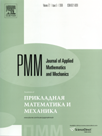 | | Journal of Applied
Mathematics and Mechanics
Russian Academy of Sciences | | Founded
in January 1936
(Translated from 1958)
Issued 6 times a year
ISSN 0021-8928
(print version) |
Archive of Issues
| Total articles in the database: | | 10610 |
| In Russian (ΟΜΜ): | | 9811
|
| In English (J. Appl. Math. Mech.): | | 799 |
|
| << Previous article | Volume 75, Issue 2 / 2011 | Next article >> |
| Kh.F. Valiyev and A.N. Kraiko, "Cylindrically and spherically symmetrical rapid intense compression of an ideal perfect gas with adiabatic exponents from 1.001 to 3," J. Appl. Math. Mech. 75 (2), 218-226 (2011) |
| Year |
2011 |
Volume |
75 |
Issue |
2 |
Pages |
218-226 |
| Title |
Cylindrically and spherically symmetrical rapid intense compression of an ideal perfect gas with adiabatic exponents from 1.001 to 3 |
| Author(s) |
Kh.F. Valiyev (Moscow, Russia, haris_valiev@mail.ru)
A.N. Kraiko (Moscow, Russia, akraiko@ciam.ru) |
| Abstract |
The problem of the rapid intense cylindrically or spherically symmetrical compression of an ideal (non-viscous and non-heat-conducting) perfect gas with different adiabatic exponents is considered. We mean by rapid and intense a compression in a time much less than the time taken for the sound wave to propagate through the uncompressed target up to temperatures and densities as high as desired. It is found that the solution previously obtained with a focused non-self-similar compression wave at the point where the shock wave is reflected from the axis or centre of symmetry (henceforth the centre of symmetry) holds for adiabatic exponents not exceeding 1.9092 and 1.8698 respectively in the cylindrical and spherical cases. It was not possible to construct a complete solution with focusing at the centre of symmetry for gases with higher adiabatic exponents. On the other hand, one can focus the compression waves into a cylinder or sphere of as small, but finite, radius as desired at the instant of arrival on them, for example, of a special characteristic or reflected shock wave of the Guderley problem. It is shown that for high degrees of compression, the time dependences of the coordinates of the pistons which produce such focusing, and of the gas density on them are close to power laws. |
| Received |
01 September 2009 |
| Link to Fulltext |
|
| << Previous article | Volume 75, Issue 2 / 2011 | Next article >> |
|
 If you find a misprint on a webpage, please help us correct it promptly - just highlight and press Ctrl+Enter If you find a misprint on a webpage, please help us correct it promptly - just highlight and press Ctrl+Enter
|
|

 Russian
Russian  English
English